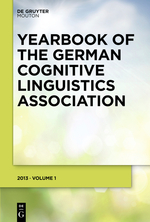 The German Cognitive Linguistics Association publishes a Yearbook in cooperation with De Gruyter Mouton. The Yearbook of the German Cognitive Linguistics Association aims to document, and thus facilitate, the dynamic exchange of scholarly ideas within the association and in the global cognitive linguistics community. It does not aim to compete with journals like CognitiveLinguistics and Language and Cognition, but to complement them by offering researchers an outlet for their work at an early stage, while maintaining the same high standards of peer review that also characterize the journals.
The German Cognitive Linguistics Association publishes a Yearbook in cooperation with De Gruyter Mouton. The Yearbook of the German Cognitive Linguistics Association aims to document, and thus facilitate, the dynamic exchange of scholarly ideas within the association and in the global cognitive linguistics community. It does not aim to compete with journals like CognitiveLinguistics and Language and Cognition, but to complement them by offering researchers an outlet for their work at an early stage, while maintaining the same high standards of peer review that also characterize the journals.
Beyond these standards, the Yearbook of the DGKL/GCLA does not impose specific topical requirements on contributions, as it aims to document the full range of topics investigated by members of the DGKL/GCLA. This includes work not just in Cognitive Linguistics in a narrow sense, but also in closely related fields such as psycholinguistics, gesture research and Cognitive Poetics. It also includes work by researchers in related frameworks that do not (yet?) consider themselves part of the Cognitive Linguistics research program, as long as there is a clear connection to the perspective adopted by the latter.
The yearbook also does not impose specific methodological requirements, as it aims to document the full range of methods employed by researchers in the community. However, past conferences indicate a clear shift away from the introspective approach that has characterized linguistic research since the 1950s and towards a range of empirical methods, including standard experimental paradigms from psychology and psycholinguistics as well as a wealth of usage-based methods, ranging from the analysis of individual texts and conversations to quantitative corpus-linguistic methods applied to very large corpora. This is a highly desirable trend and we hope to see it represented strongly in the Yearbook of the German Cognitive Linguistics Association